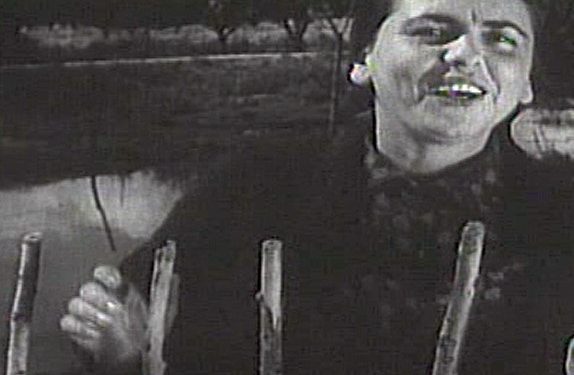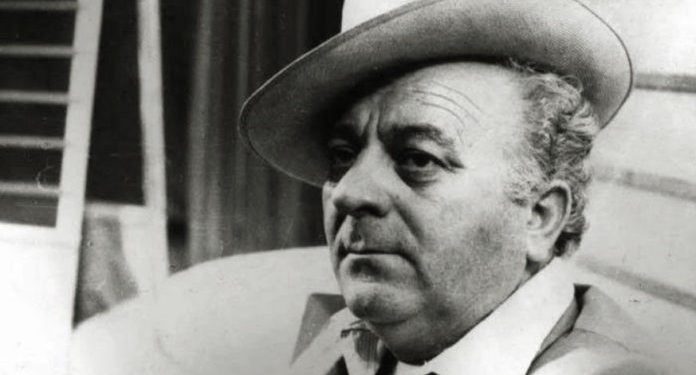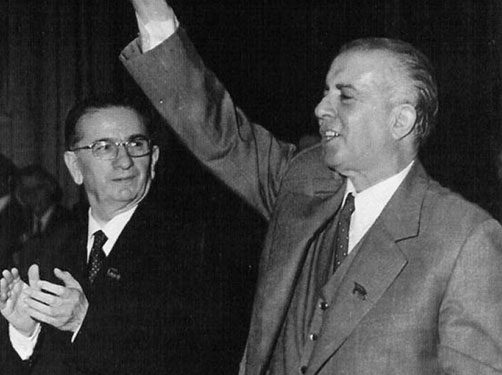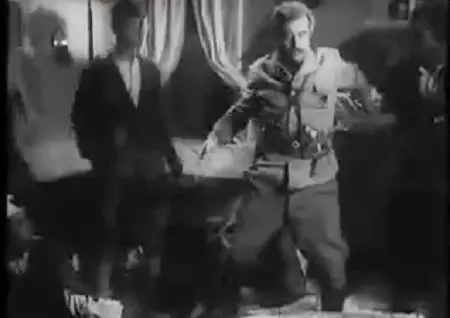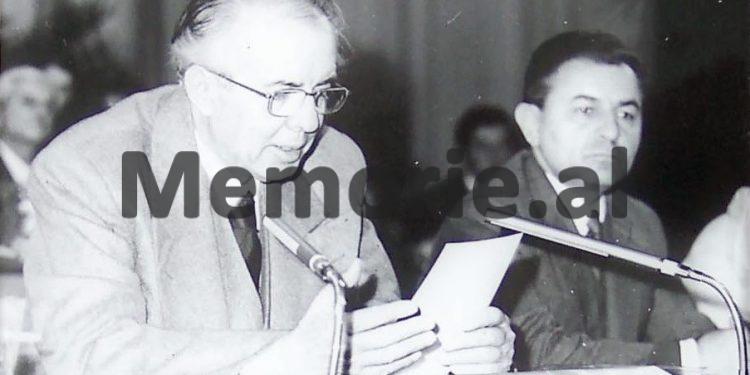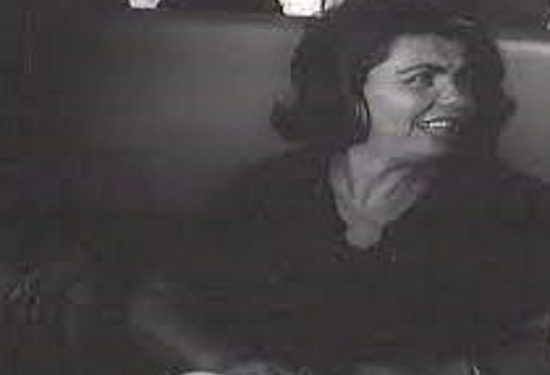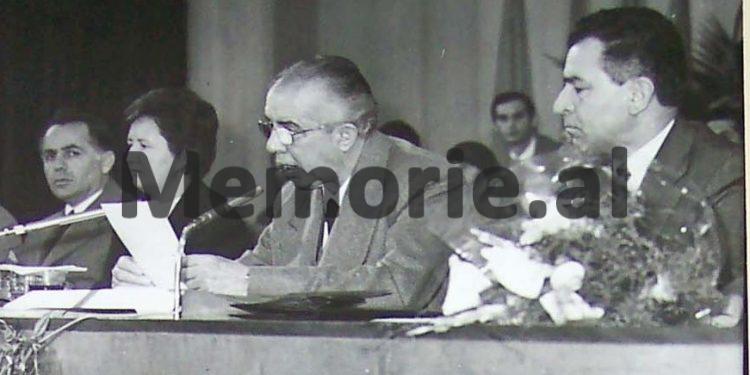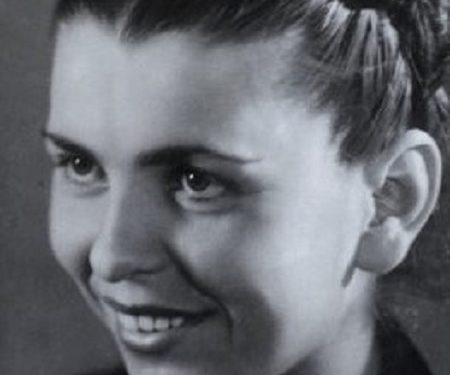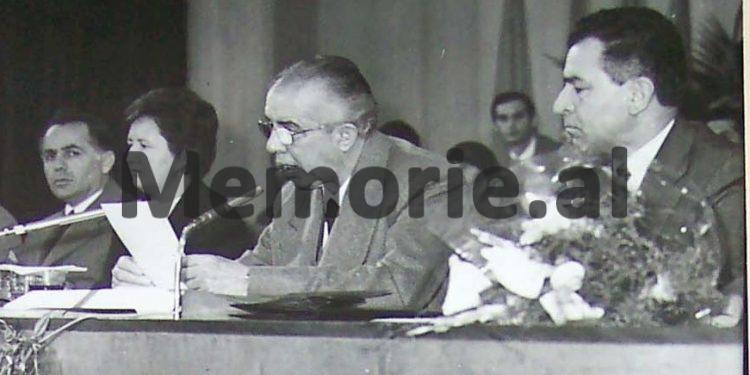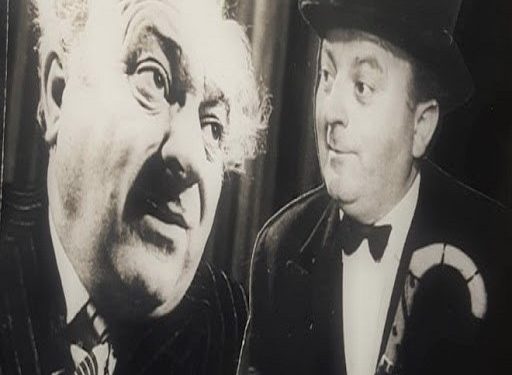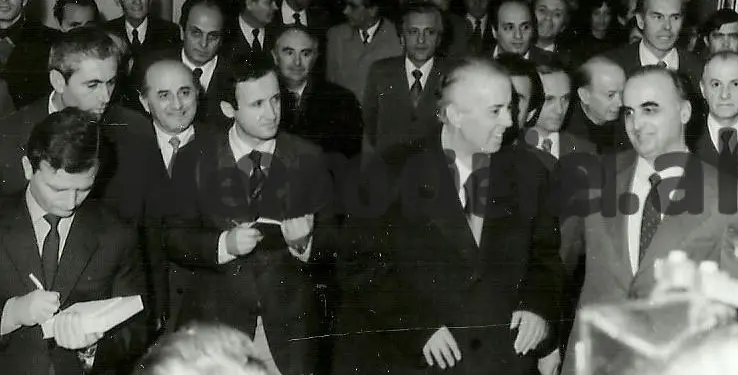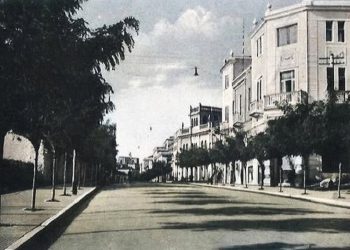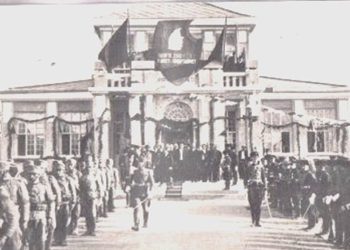Dashnor Kaloçi
Memorie.al publishes some archival documents issued by the Central State Archive in Tirana (fund of the former Central Committee of the ALP), which contains a record of the meeting of the Secretariat of the Central Committee held on May 25, 1978 , on the topic: “On a situation and on some problems that arise to increase the ideo-artistic level, the creativity of theater and professional variety”, which was directed by Enver Hoxha, which was also attended by Ramiz Alia, secretary of the Central Committee covering propaganda, art and culture, Pilo Peristeri, candidate of the Politburo and Director of the Tractor Factory, “Enver Hoxha”, Deputy Minister of Education and Culture, Anastas Kondo and President of the League of Writers and Artists of Albania, Dritëro Agolli. The full minutes of that meeting led by Enver Hoxha, where the famous actor and director of the Albanian theater and cinematography, Pirro Mani, the well-known actress of the National Theater, Violeta Manushi, the professional pop actor were also invited and participated. of the city of Shkodra, Tano Banushi, etc.
“Our theater has a great experience in collaboration with actors – playwrights. Whenever this work was done well, there was a harmony between the author and the theater director, always the results were positive. From this warm cooperation, concrete and not in general, we have left or will remain many dignified works in its golden fund of our scene, starting from the first works such as “Our Land”, “Family of fisherman ”,“ Cuca e maleve ”, etc. I mentioned some of these works which are quite serious. This cooperation, especially recently, has become even stronger, more concrete. In our theater we have a lot of staff who do not work in the theater, but deal with writing and are writers. They not only help us with their works, but they also come to the theater, got acquainted with the process of staging, get acquainted with the laws of the stage, which is more than necessary for the author. We have trusted our young people with courage, we have stayed very close to the whole team, the organization, we old directors and there have really been results. For example, Dhimitër Pecani, not only successfully deputy on our stage, but he also went to Fier where he gave a beautiful play for the theater of Fier. In addition, there are a large number of television directors, such as Albert Minga who has emerged from the bosom of television, the People’s Theater, as well as Vladimir Prifti and Agim Qirjaqi. So we have to trust the “conductor’s stick” of the director, the young guys to come forward and show talents, because our people are very talented”
This is what the well-known theater director Pirro Mani said in his discussion, in one of the meetings of the Secretariat of the Central Committee of the ALP held on May 25, 1978, which was chaired by Enver Hoxha, where they participated also Ramiz Alia, Pilo Peristeri, Anastas Kondo and Dritëro Agolli. In that meeting with the topic: “On a situation and on some problems that arise to increase the ideo-artistic level of the creativity of theater and professional variety”, in addition to Pirro Mani, participated the well-known actress of the People’s Theater, Violeta Manushi, actor of professional pop music of the city of Shkodra, Tano Banushi, etc.
For more than what was spoken and discussed in that meeting by Enver Hoxha, Ramiz Alia, Anastas Kondo and Dritëro Agolli, as well as by the guests: Pirro Mani, Violeta Manushi and Tano Banushi, the archival document in question introduces us to the minutes of that meeting of the Secretariat of the Central Committee of the ALP, which Memorie.al publishes for the first time and in full in some issues of the dossier section.
Minutes of the meeting of the Secretariat of the Central Committee of the ALP, May 25, 1978
“ON THE SITUATION AND ON SOME PROBLEMS THAT ARISE FOR THE INCREASE OF THE IDEOARTISTIC LEVEL OF THE PROFESSIONAL THEATER AND POETRY CREATIVITY”
COMRADE ENVER HOXHA: Come on, stay. Welcome. How are you my friend Violeta?
FRIEND VIOLETA MANUSHI: Thank you, Comrade Enver… I’m fine.
COMRADE ENVER HOXHA: How are we going to start, Comrade Ramiz?
COMRADE RAMIZ ALIA: Maybe we start talking to the participants who have been invited to this meeting.
COMRADE ENVER HOXHA: Yes, yes, they talk every day on television, on the stage of theaters, variety shows, cinematography, in books.
COMRADE PILO PERISTERI: There is a question addressed to the comrades of the League of Writers and Artists about the work of pop and theaters: Does the League influence their work, does it play any role?
COMRADE ENVER HOXHA: Can you, friends of art and culture, say anything good to us in your discussions, do not just tell us the good. We know there are flaws but we want you to tell us something about the perspective as well. So what do you think, you can do better, more and what help we still have to give you to make things work even better in this area.
FRIEND VIOLETA MANUSHI: I am getting up to spoken, although I also have emotions, Comrade Enver.
COMRADE ENVER HOXHA: You have a little heavy hand, said the postman in the movie.
FRIEND VIOLETA MANUSHI: I also find the word heavy (laughter).
COMRADE ENVER HOXHA: Therefore give Violeta, speak as she speaks on the theater stage.
COMRADE RAMIZ ALIA: Leave what you have prepared in writing, Violeta, you better speak like this without a letter.
FRIEND VIOLETA MANUSHI: Yes, yes, I will speak without a letter. The successes of the creativity of theaters and variety shows are also presented in the report that was prepared in this meeting, so we are not talking about them. We also agree with the report which reflects the work that has been done. The beginning is very auspicious until we start collaborating with a great understanding with the authors, so that our work becomes a collective and not individual art. This is a good thing, so the prospect is huge. Only the love of writers for art and work should be more partisan and to appreciate what the Party says, to write about all the problems, that our repertoire is still not bringing to the stage those troubles that our life has, we are still stuck with the topic of the past. Naturally, we will have this topic for the rest of our lives, but we also need the worries of the current life, and this is shown by watching the shows. For example, we can watch the latest show of theaters and pop music, where we were able to raise the problems of the day, we cannot cope with the demands of spectators and are using all ways and forms as authorized by work centers, etc. That there are many requests to see the show. This shows that the current topic is vital and our spectator sees himself. So the writer and we are inseparable and, I can put it figuratively, they are flour, we are bread. Without them we cannot do.
COMRADE ENVER HOXHA: There is no theater without a book.
FRIEND VIOLETA MANUSHI: Writers and artists are connected like flesh and blood. The help so far has been good. Writers are working hard, but drama is a difficult genre and it is not taken immediately, although the cooperation should be both on their part and on our part, because we often, with our fair judgment, have made drama to see the scene. It seems to me that in this regard there is a much bigger difference than in the past. We understand. Not only the director works for the drama, but the whole collective is preoccupied with it. I talk about the experience of the theater troupe, where I belong and I think it is the same in other troupes, since the instructions of the Party are the same everywhere. The drama is not only watched by the directorate and the artistic council, but also by the organizations – the Party base and the collective, everyone is giving their opinion, everyone is worried enough to stage the part that has been prepared.
What is the other concern we have? It seems to me that still the woman in our dramas does not represent the social reality that exists, that the woman is a great force in the construction of socialist society. This is neither constructive nor with those leadership competencies, but it is always ahstu, not exactly as it should be. Although there is a very big difference, still the figure of the woman in our dramas comes out faint. This is a minus that we have to correct that the figure of the woman has been raised by the Party, this is what our life says, and we cannot go outside it.
COMRADE ENVER HOXHA: All right, let more work be done by our writers and artists so that the figure of the Albanian woman takes the right place in the works of art.
FRIEND VIOLETA MANUSHI: Regarding the legacy we must leave to the generations, a great deal of work is being done with our team. Several generations continue to work in our theater troupe, we are the ones who have reached the age, we have the next generation, we also have young people, but there is an understanding between us. I say responsibly Party, that after the 4th plenum of the Central Committee of the Party there is a great break of the concept and the anti-party thought that exists for the “war between the generations”. Our collective, I always talk about the National Theater, is a partisan collective. Even friends who have come and checked our work can attest to this. We have a team with great willingness, that a sense of love and respect for the work of the elders and know how to behave with the elders. Thus, our knowledge and experience is conveyed with ease and kindness to the youth. We would be very sorry if our relay did not pass into safe hands. We in our team give a lot of love to this relay and they take it as well, with love and respect. We have a very big understanding. I say that this understanding, this sound condition in the collective, has brought the good results that our theater has always come out white-faced. I am not saying that we have never been wrong, but our work, our efforts, my struggle are always for the better.
I think there is little talk about work related to heritage. There will come a day when generations want to know what has been done. All our hard work, with all the opportunities you know we had, since we had not come from schools, should leave a mark. We, the older generation, are people who had a passion for the work of an actor and the party gathered us and gave us the opportunity to become one. We accumulated an experience, but in fact our theater archives are very poor. There are parts that are not mentioned at all, there are others about which little is written, but when I say a little, very little. Tomorrow they will ask about one or the other, for whom it is written what they did? But these are very little documented. There are shows for ciulat I’m sorry because I wish they existed. Future generations will learn from us and from the good sides, even from our flaws and shortcomings.
COMRADE ENVER HOXHA: Yes, my friend Violeta rightly raises this problem. Everywhere this is done, as you say. Here, let’s take Moliere comedies, which I know well. They, when they first appeared on stage, to this day, have their own history. It is known who played these, or that role in the comedy “Truffle”, for example. Or who played the role of Harpagon in the comedy “Stinginess”, etc. Care has been taken since then, not today.
COMRADE RAMIZ ALIA: The Shkodra Theater has it all.
COMRADE DRITËRO AGOLLI: Tano Banushi also has invitations that were staged in 1948.
COMRADE RAMIZ ALIA: They have it all, even the posters and invitations.
FRIEND VIOLETA MANUSHI: Even we have, we even have a very passionate friend to save these, Gjon karma, he is retired, however he comes and works, but we must be careful in this regard that we do everything alone John ?!
COMRADE RAMIZ ALIA: That’s right, the remark is right.
FRIEND VIOLETA MANUSHI: To be honest, a little care is shown, it even seems like a luxury when the actor asks for something about the dramas that have been staged long ago. I even see it in myself over time and I am not able to recall makeup when I do not have the picture. Photography is what reminds me. Now this is a small problem, but I think more care should be taken.
COMRADE TANO BANUSHI: These materials make up the biography of the theater, these are his life.
COMRADE ENVER HOXHA: My friend Violeta is very right. Did you friends take note? To do these jobs well, because they play an important role for today and for the future.
COMRADE RAMZ ALIA: That’s right.
COMRADE TANO BANUSHI: I remember, when a seminar was once held in Shkodra, where there were participants from all districts, it was said that the care for the preservation of theater materials should be from everyone and we will gladly not take special man for that job. The seminar here was more of a guide on how to keep these materials, after that I do not know what happened?
COMRADE VIOLETA MANUSHI: In addition to the preoccupation we have to ensure a sound repertoire with partisanship and diverse positive, it is after the 4th Plenum of the Central Committee of the Party, the fact that we try to solve the problems raised by the repertoire. we reinforce them and be more able to bring them properly on stage, based on the party materials and looking at them in life according to the problem. I am giving two examples: We now have to stage the part “The Great Faith” that talks about the Albanian League of Prizren and for this we sought the help of historians. Even the press n aka helped a lot that almost every day he gives material for those characters we have in the drama. We are using photographs, museums and all. This has been done as a task, it has entered as a necessity.
COMRADE ENVER HOXHA: It has become like a second life. Memorie.al
Continues in the next issue




